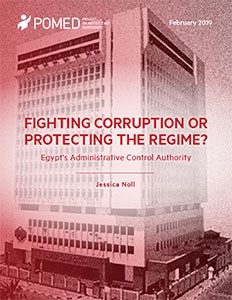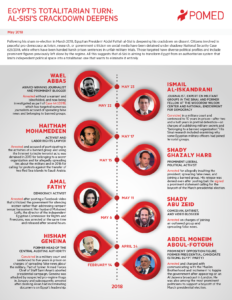The apparent trigger for the demonstrations was almost as unexpected: Mohamed Ali, a 45-year-old construction contractor and part-time actor who says he got rich building projects for the Egyptian military and then left for Spain to live in self-imposed exile, where he began posting videos on social media accusing Mr. el-Sisi of corruption and hypocrisy.
In the three weeks since his first video appeared, Mr. Ali has reinvented himself as a whistle-blower, an el-Sisi antagonist and a protest guru, and his tales of corruption at the top have transformed him into a leading voice of opposition to the president. When the protests erupted, it was at the time and date Mr. Ali had urged from afar.
 “It is sort of odd,” said Amy Hawthorne, the deputy director for research at the Project on Middle East Democracy (left). “Who is this person, who is he connected to, what led him to come out with these allegations now? Obviously he’s very well connected, but who exactly are his connections?”
“It is sort of odd,” said Amy Hawthorne, the deputy director for research at the Project on Middle East Democracy (left). “Who is this person, who is he connected to, what led him to come out with these allegations now? Obviously he’s very well connected, but who exactly are his connections?”
“He’s not a person from the opposition that seemed to have an ax to grind,” said Michele Dunne, the director of the Middle East program at the Carnegie Endowment for International Peace. “He’s seen as a bit of a common man, not an elite figure speaking to them about abstract elite concepts.”
n recent days, another Egyptian activist had also posted a video alleging the involvement of Mr Sisi’s son, Mahmoud, in the lucrative business of smuggling goods into the Gaza Strip, as well as detailing human rights abuses by the armed forces in a battle against radical Islamist militants in the northern Sinai Peninsula, The Independent adds.
 “The toxic combination is economic hardship plus evidence of corruption,” said former US diplomat Dunne, a board member of the National Endowment for Democracy. “That’s where the Mohamed Ali came in, speaking openly about what people have suspected.”
“The toxic combination is economic hardship plus evidence of corruption,” said former US diplomat Dunne, a board member of the National Endowment for Democracy. “That’s where the Mohamed Ali came in, speaking openly about what people have suspected.”
Many Egyptians are frustrated with a lack of political freedom and declining standard of living in the country after Mr. Sisi’s government devalued Egypt’s currency and raised the prices of basic goods and services including fuel, electricity and subway tickets. The changes are part of austerity called for under a $12 billion loan from the International Monetary Fund agreed upon in 2016, The Wall Street Journal adds.
 “There’s a lot of angry energy, frustration over six years, and it hasn’t found a way to come out at all. This is the first time it just explodes in the face of the government since 2013,” said Mohamed Lotfy, head of the Egyptian Commission for Rights and Freedoms (above).
“There’s a lot of angry energy, frustration over six years, and it hasn’t found a way to come out at all. This is the first time it just explodes in the face of the government since 2013,” said Mohamed Lotfy, head of the Egyptian Commission for Rights and Freedoms (above).
In Egypt, systemic and massive corruption on a scale difficult to overstate has long been a staple of oppressive governments, from Mubarak to Sisi, The Soufan Group adds:
Since taking power in 2014 after a military coup, Sisi has consolidated power while extinguishing almost all political and social opposition far beyond anything during the long Mubarak regime. Sisi has equated criticism of himself as treason against the government and arrested or intimidated thousands of journalists and activists to ensure there are no credible alternatives to his rule. The despot’s playbook remains as effective as it is well-worn: all opposition is considered illegitimate.

 “It’s a turning point in Egypt’s contemporary affairs,”
“It’s a turning point in Egypt’s contemporary affairs,” 





